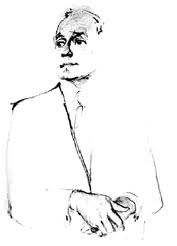I’ve been reading a book—not a new one, alas—about Jack Benny. The experience has proved to be unexpectedly sobering.
Benny died in 1974, the year that I graduated from high school, and is now, so far as I can tell, pretty much unknown to everyone younger than I am. Yet there was a time when he was one of the most famous people in America, and his fame was not short-lived: he appeared weekly on radio from 1932 to 1955 and regularly on TV from 1950 to 1965. Nor was he in any way culturally insignificant. Benny and his writers may not have invented situation comedy, but it’s generally agreed that they perfected it. (Gary Giddins has written perceptively about Benny’s contributions to modern comedy.) So why is he forgotten today?
 The answer is, of course, that Benny did his best and most individual work on network radio, a medium that hit the skids around 1950 and for all intents and purposes ceased to exist in 1962, when the last surviving weekly dramatic series, Suspense and Yours Truly, Johnny Dollar, were cancelled by CBS. Virtually all of Benny’s radio shows were recorded, most of them in decent sound, and a high percentage of them can be heard on line by anyone who cares to search for them. Alas, few are inclined to bother, and so it seems highly unlikely that any classic radio series, even one as good as The Jack Benny Program, will find a new audience in the twenty-first century.
The answer is, of course, that Benny did his best and most individual work on network radio, a medium that hit the skids around 1950 and for all intents and purposes ceased to exist in 1962, when the last surviving weekly dramatic series, Suspense and Yours Truly, Johnny Dollar, were cancelled by CBS. Virtually all of Benny’s radio shows were recorded, most of them in decent sound, and a high percentage of them can be heard on line by anyone who cares to search for them. Alas, few are inclined to bother, and so it seems highly unlikely that any classic radio series, even one as good as The Jack Benny Program, will find a new audience in the twenty-first century.
That a giant of comedy like Jack Benny should have faded from our collective consciousness is not all that surprising, though it makes me sad, as do all such manifestations of the vanity of human wishes. What really jolted me was to read the other day that the Jimmy Stewart Museum was in dire financial straits. Stewart, needless to say, appeared in a considerable number of the most popular and critically acclaimed movies made in Hollywood in the twentieth century. But now that so many young people are unwilling to watch movies made before they were born, I find myself wondering whether any actor of the studio era, even the universally admired star of such celebrated films as Anatomy of a Murder, It’s a Wonderful Life, The Philadelphia Story, Rear Window, The Shop Around the Corner, and Vertigo, can count on being widely remembered over the very long haul.
As for Benny, I suspect that he will be remembered longest for his role in Ernst Lubitsch’s To Be or Not to Be, the only first-rate film in which he starred. You don’t have to know anything about Benny to appreciate the uncanny skill with which he impersonates a ham actor who longs desperately to play Hamlet, and that is why his performance in To Be or Not to Be can still be appreciated today.
Not so Benny the radio star, whose hopelessly inept violin playing and pretended stinginess and vanity long ago disappeared into the cultural memory hole. Up to a point, I’m sorry to see them go. For anyone at all familiar with Benny’s painstakingly worked-up comic persona, his show remains a fully valid theatrical experience, and were there world enough and time, I’d happily fritter away half-hour upon half-hour listening to one episode after another on my iPod.
Now that I’ve settled into middle age, though, I’m increasingly inclined to feel that life is too short to waste on situation comedies, even those as splendidly wrought as the radio version of The Jack Benny Program. (The TV version, though effective, wasn’t nearly as good.) I need richer, more emotionally complex comic fare, be it Noël Coward, Howard Hawks, or Shakespeare—or the brilliantly concise animated cartoons of the Forties and early Fifties, which can still make me laugh out loud. Not so the shows that occupy the airwaves today. I loathe the snarky, reflexively referential Irony Lite of today’s single-camera TV comedies and animated sitcoms.
At the same time, I now find even the best sitcoms of the Sixties and Seventies to be insufficiently pointed to satisfy my mature taste. As much as I love to laugh, I find that these series are no longer capable of supplying me with the aesthetic and spiritual nourishment that I need to get through the day. I want comedy that bites—hard—and the closer it gets to the knuckle, the louder I laugh. I wonder whether I’ll still feel that way when I grow old.
